1. Early Life and Playing Career
Manuel Pellegrini's formative years were marked by a strong academic pursuit alongside his burgeoning football talent. His playing career as a defender was primarily spent at one club in Chile, followed by a brief international stint, before he retired to focus on engineering projects.
1.1. Early Life and Education
Born in Santiago, Chile, to Italian parents, Manuel Luis Pellegrini Ripamonti pursued higher education at the Pontifical Catholic University of Chile in Santiago. He graduated in civil engineering in 1979, a qualification that later led to his well-known nickname "El Ingeniero" (The Engineer), reflecting his analytical and methodical approach to football.
1.2. Club Career
Pellegrini began his football journey in the youth divisions of Audax Italiano before moving to Club Universidad de Chile, where he spent his entire professional playing career as a defender from 1973 to 1986. During his tenure, he made a total of 451 appearances in the Chilean Division 1, scoring seven goals, including one against Universidad de Chile's fierce rivals, Colo-Colo. The 1970s were a challenging period for Club Universidad de Chile, as they had not won the national Copa Chile championship since 1969. However, this changed in 1979 when the club secured the championship and qualified for the 1980 Copa Libertadores, notably defeating Colo-Colo in both tournaments.
1.3. International Career
Pellegrini's international career with the Chile national team was brief, earning a single cap. This appearance came as a starter in a 1-1 friendly draw against Brazil on 7 May 1986.
1.4. Retirement from Playing
Pellegrini retired from playing in February 1987 after a Copa Chile match against Trasandino. He explained his decision, recalling an incident where a 17-year-old Iván Zamorano, then on loan from Cobresal, out-jumped him to score: "Our goalkeeper parried the shot of a rival player, I jumped to clear the ball, and behind me came a 17-year-old boy who jumped half a metre above me, and scored. That day I decided I couldn't keep going." Pellegrini later joked, "If I had known where that boy would get, I would not have retired. I would have kept playing two more years." After his retirement, Pellegrini dedicated himself to civil engineering projects, eager to assist with reconstruction efforts in the Chilean central zone following the devastating 1985 Algarrobo earthquake, leveraging his expertise as a qualified engineer.
2. Managerial Career
Manuel Pellegrini's extensive managerial career spans across South America, Spain, England, and China, marked by significant achievements and a consistent record of success.
2.1. Early Years in South America
Pellegrini began his coaching career with his former club, Club Universidad de Chile, during the 1988 season. However, he left mid-season to attend football coaching courses in Europe. His departure coincided with the team's poor performance, leading to their relegation to the Division 2 for the first time in their history. Nevertheless, the club swiftly returned to Division 1 in 1989 after winning the Division 2 championship.
In 1990, Pellegrini was appointed as the assistant coach for the Chile national team and manager of the under-20 team under head coach Arturo Salah. He then took on managerial roles at C.D. Palestino from 1990 to 1992, and C.D. O'Higgins for a year in 1992. In 1993, he moved to Universidad Católica, one of Chile's most popular clubs. There, he managed notable players such as Alberto Acosta and Nestor Gorosito, leading the team to victory in the prestigious Copa Interamericana in 1994 and the 1995 Copa Chile. Despite these cup successes, he finished as runner-up in the local Campeonato Nacional championship in both 1994 and 1995.
After a brief second spell at Palestino in 1998, Pellegrini was recruited by Ecuadorian club L.D.U. Quito in 1999. He guided the club to a national title in the Serie A that year, establishing a coaching legacy for the team. His successful run in the Copa Libertadores also garnered attention from other South American managers.
In 2001, Pellegrini joined Argentine club San Lorenzo, where he achieved their first international title by winning the Copa Mercosur. He also led San Lorenzo to victory in the Argentine Clausura championship. His appointment was notably recommended by San Lorenzo icon Nestor Gorosito, who had previously worked with Pellegrini at Universidad Católica.
From 2002 to 2003, Pellegrini managed Argentine club River Plate. He secured the Clausura championships in 2003, notably utilizing the talents of Andrés D'Alessandro, a playmaker often compared to Diego Maradona. However, D'Alessandro's subsequent sale to VfL Wolfsburg presented a significant challenge, and Pellegrini's team struggled to defend their Argentine championship status in the 2003 Torneo Apertura, leading to his resignation at the end of the campaign.
2.2. Villarreal
Pellegrini assumed the managerial duties at Villarreal on 1 July 2004, marking his entry into European football. In his inaugural season, Villarreal secured a third-place finish in La Liga in 2004-05, qualifying for the UEFA Champions League, and reached the quarter-finals of the UEFA Cup. The subsequent season, 2005-06, saw Villarreal make a remarkable run to the semi-finals of the 2005-06 UEFA Champions League, where they were narrowly defeated by Arsenal. Despite this European success, they finished seventh in La Liga that year.
Over the next two seasons, Villarreal finished fifth and then achieved a historic second-place finish in La Liga in 2007-08, breaking the dominance of the traditional "big two" clubs. Pellegrini led El Submarino Amarillo to the Champions League knockout stages once more, where they again faced Arsenal in the quarter-finals, losing 4-1 on aggregate. During his tenure, Pellegrini extended his contract until 2011. Notably, he had a public conflict with playmaker Juan Román Riquelme at the end of 2006, ultimately leading to Riquelme's benching and eventual departure, after which Villarreal's performance improved significantly. On 31 May 2009, following speculation linking him to Real Madrid, Pellegrini stated that no one from Real Madrid had approached him and that he was still under contract with Villarreal. However, on 1 June 2009, a Villarreal executive announced Pellegrini's departure, confirming that Real Madrid would pay his 4.00 M EUR termination clause. His time at Villarreal was highly successful, with a win percentage of 56.67%, making him the second most successful South American manager in La Liga over the previous 25 years.
2.3. Real Madrid
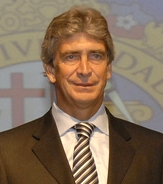
On 1 June 2009, Pellegrini was officially appointed as manager of Real Madrid, signing a two-year contract. He was the first manager chosen during Florentino Pérez's second tenure as club president. Upon his presentation, he expressed his excitement and pride at leading "perhaps the most important club in the world." In an ambitious summer transfer window, Pellegrini oversaw the acquisition of high-profile players such as Kaká from Milan, Cristiano Ronaldo from Manchester United for 80.00 M GBP, Karim Benzema from Lyon for 30.00 M GBP, and Xabi Alonso from Liverpool for 30.00 M GBP, amounting to a total spending of approximately 200.00 M GBP.
Pellegrini's first competitive fixture was a friendly win against Shamrock Rovers in July 2009. However, the club finished as a semi-finalist in the Peace Cup 2009, losing to Juventus. His first La Liga game as manager was a 3-2 victory away to Deportivo de La Coruña.
The season, however, was marred by early cup exits. On 27 October 2009, Real Madrid suffered a shocking elimination from the Copa del Rey in the Round of 16, losing 4-1 on aggregate to the modest Segunda División B club Alcorcón. This defeat was infamously dubbed "Alcorconazo" by the Spanish daily Marca. Further disappointment came on 10 March 2010, when Madrid was eliminated from the Champions League by Lyon in the Round of 16, with a 2-1 aggregate loss. Following this defeat, Florentino Pérez reportedly issued an ultimatum to Pellegrini, warning him that he would be dismissed if the team did not win the La Liga title.
Pellegrini's Real Madrid team achieved a remarkable 96 points in La Liga, which was, at the time, the highest points total Real Madrid had ever achieved in a league season. However, they still finished as runner-up, three points behind arch-rival Barcelona, who amassed 99 points. On 26 May 2010, Real Madrid's directors announced Pellegrini's dismissal, stating he would be replaced by José Mourinho, although they admitted they would have retained Pellegrini if the opportunity to hire Mourinho had not arisen.
Pellegrini later voiced his frustrations with the club's controversial Galácticos policy, which he felt hindered his ability to build a balanced team. He famously remarked, "I didn't have a voice or a vote at Madrid. They sign the best players, but not the best players needed in a certain position. It's no good having an orchestra with the 10 best guitarists if I don't have a pianist. Real Madrid have the best guitarists, but if I ask them to play the piano they won't be able to do it so well." He also lamented that Pérez sold players he considered important, and he believed they failed to win the Champions League because the squad was not properly structured for such success.
2.4. Málaga
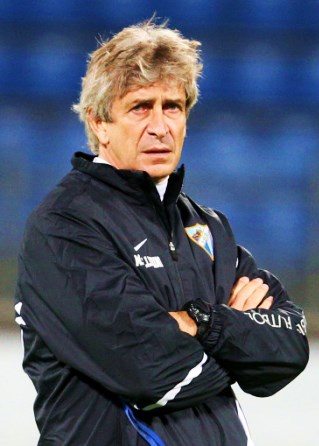
After his departure from Real Madrid, Pellegrini received an offer from the Mexico national team on 22 July 2010, following Javier Aguirre's resignation. However, he ultimately signed a three-year contract with La Liga club Málaga on 5 November, replacing the dismissed coach Jesualdo Ferreira. His official presentation took place with club owner Abdullah bin Nasser Al Thani. He observed from the stands as Málaga lost 1-0 to Espanyol the following day.
Pellegrini's debut as Málaga coach came on 11 November 2010, in a 3-2 victory against Hércules in the Copa del Rey at the La Rosaleda, securing their progression to the Round of 16. Four days later, he continued his winning start by beating Levante 1-0 in his league debut. That season, Málaga finished 11th.
In his first full season, Pellegrini led Málaga to a club record-breaking 58 points and a fourth-place finish in the league, earning them a historic qualification for the Champions League qualifiers. Despite the club's ongoing financial problems and the departure of key players like Santi Cazorla and Salomón Rondón, Pellegrini publicly committed to staying on 10 August 2012.
Málaga made an impressive run in the Champions League, progressing to the knockout stage unbeaten after winning three and drawing three matches in the group stage, where they faced Milan, Zenit Saint Petersburg, and Anderlecht. They then defeated Porto 2-1 on aggregate in the Round of 16. Their journey ended dramatically in the quarter-finals, where they were eliminated by Borussia Dortmund after conceding two stoppage-time goals. Pellegrini became the only coach to guide two different teams to the Champions League quarter-finals in their debut seasons in the competition.
On 22 May 2013, at Málaga's end-of-season award ceremony, Pellegrini announced his departure from the club at the conclusion of the season. Málaga finished sixth that season but was excluded from European competition due to Financial Fair Play. In recognition of his contributions, a roundabout in Malaga was named in his honor in October 2018.
2.5. Manchester City
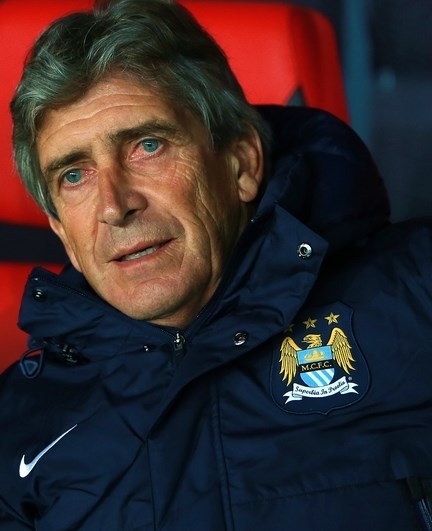
On 30 May 2013, Pellegrini confirmed a verbal agreement to become the new manager of Premier League club Manchester City. His appointment on a three-year contract was officially announced on 14 June 2013. Pellegrini expressed his delight at accepting "this hugely exciting opportunity," becoming only the fifth non-European, and the first Chilean, manager in the Premier League.
Pellegrini's initial start saw four league losses by the end of November, but the team quickly found its stride with commanding wins against Newcastle United, Manchester United, and Norwich City. After their fourth league loss on 10 November 2013, City embarked on an impressive 20-match unbeaten streak across all competitions. This run included a 6-0 thrashing of Tottenham Hotspur, a 3-2 away victory against European champions Bayern Munich, and a 6-3 win over then-league leaders Arsenal.
The team's prolific scoring continued into the festive period. A 9-0 aggregate triumph over West Ham United in the Football League Cup semi-final (a competition record) and a 5-1 win against Tottenham Hotspur at White Hart Lane maintained City's average of over three goals per game. Their dominant performances led some opponents to openly describe City as the best team in the world, and media speculation about an unprecedented quadruple emerged.
Pellegrini was awarded the Premier League Manager of the Month for December 2013. By 18 January 2014, City had surpassed 100 goals for the season across all competitions in just 34 games, setting a new record for the quickest century in the Premier League era. By the end of January 2014, they had scored 115 goals in all competitions, the most by any club in Europe at that time.
On 2 March 2014, Pellegrini secured his first major trophy in European football as Manchester City defeated Sunderland 3-1 at Wembley in the 2014 Football League Cup Final. On 11 May, Manchester City clinched the Premier League championship after a 2-0 victory over West Ham United, with goals from Samir Nasri and Vincent Kompany at the City of Manchester Stadium. This made Pellegrini the first coach from outside Europe to win the English league title. The title-winning season was notable for Manchester City's attacking prowess, with the team scoring 151 goals in all competitions, an English football record.
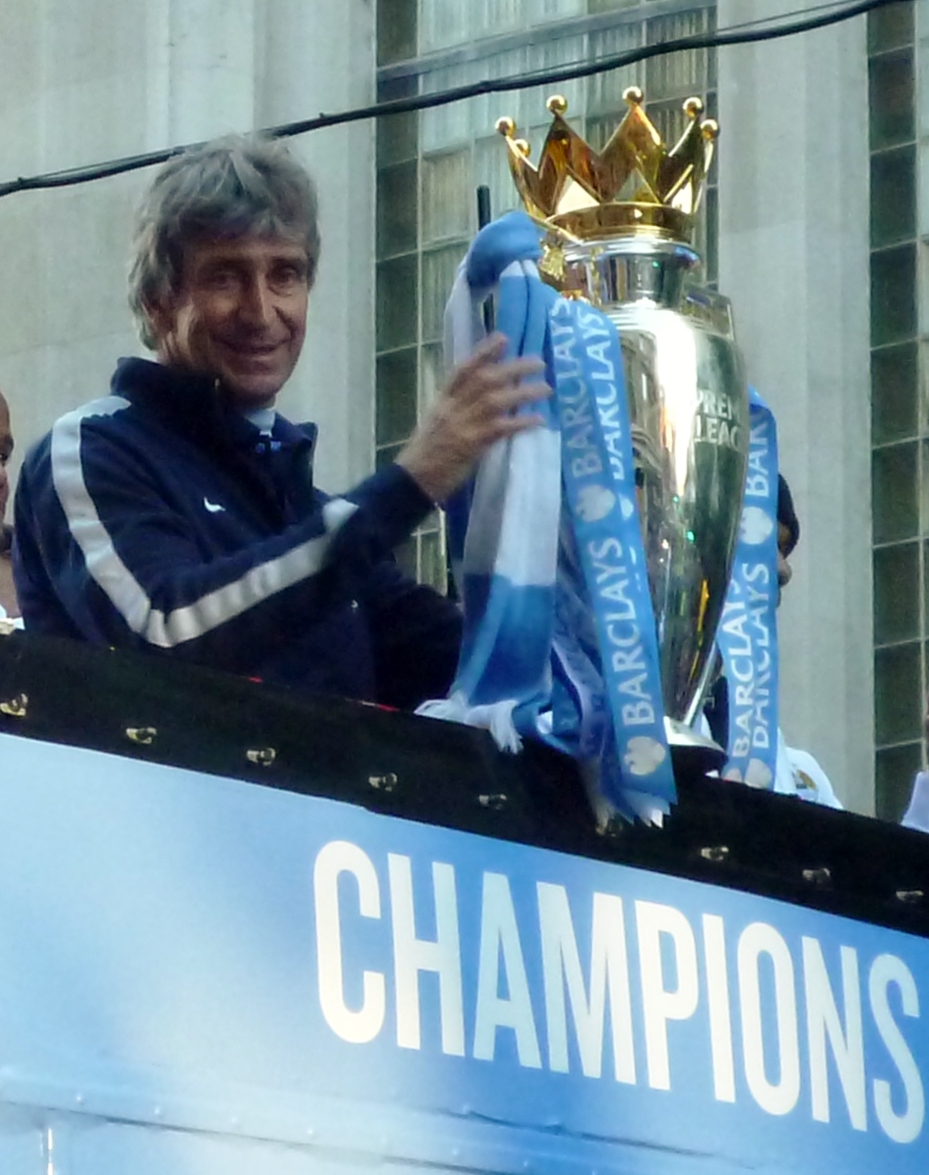
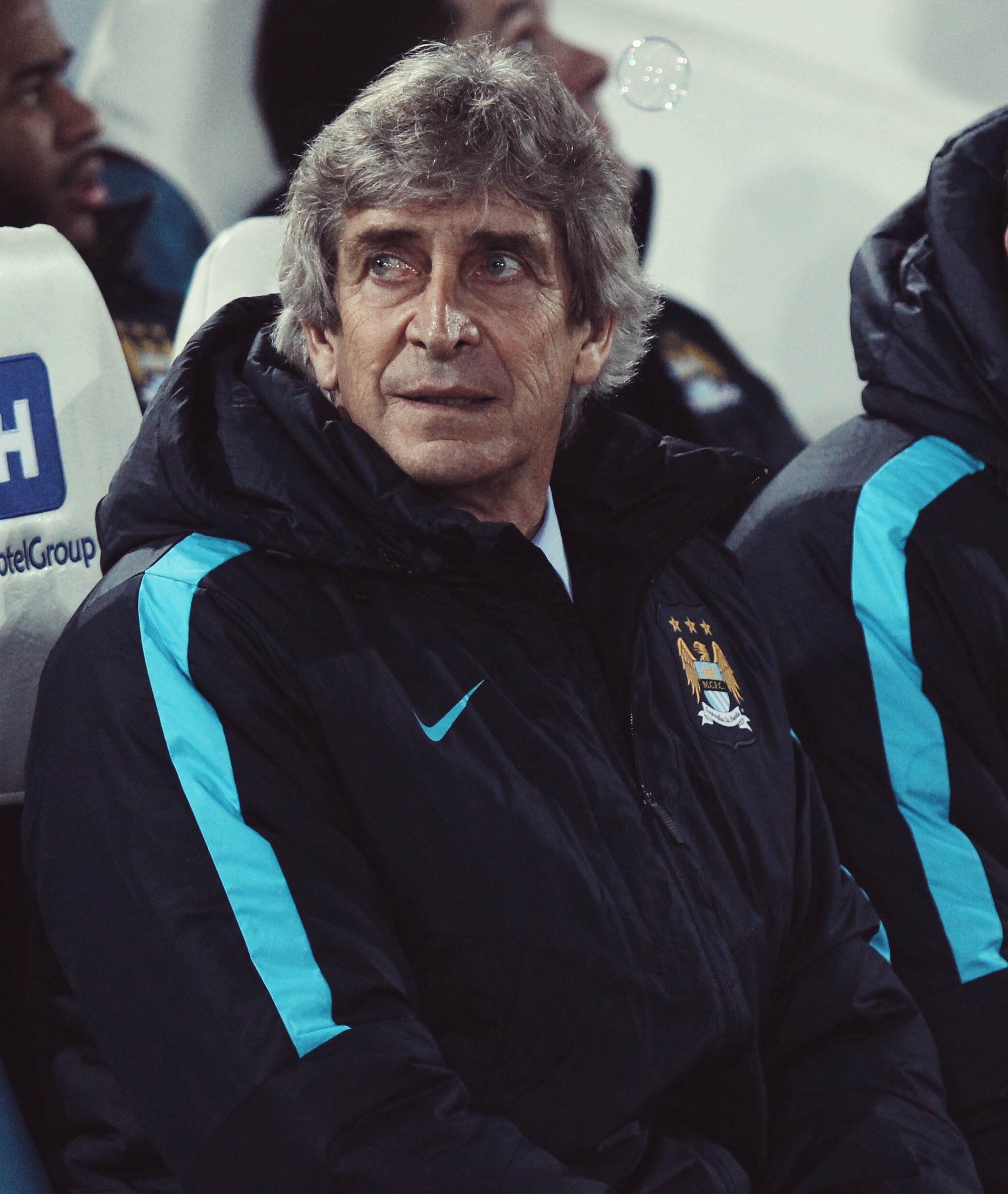
In the 2014-15 season, City's attempt to defend their League Cup title ended on 29 October 2014 with a 2-0 defeat to Newcastle United. On 24 January 2015, they were also knocked out of the FA Cup following a 2-0 loss to Championship team Middlesbrough. Despite sharing the top spot in the Premier League on New Year's Day, Manchester City experienced a significant dip in form during the second half of the season, securing only 18 points from a possible 36. They were also eliminated from the Champions League in the Round of 16 for a second consecutive season, losing 3-1 on aggregate to Barcelona.
On 7 August 2015, Manchester City announced that Pellegrini had signed a one-year contract extension, keeping him at the club until June 2016. However, on 1 February 2016, the club confirmed that Pellegrini would be leaving at the end of his contract in June, with Pep Guardiola slated to take over for the 2016-17 season. Pellegrini concluded his tenure at Manchester City with the fifth-highest win percentage in Premier League history. He successfully led Manchester City to their first-ever Champions League semi-final appearance in 2015-16, his final season, despite the team finishing fourth in the league.
2.6. Hebei China Fortune
On 27 August 2016, Pellegrini was appointed manager of Chinese Super League club Hebei China Fortune, succeeding Li Tie. His first match in charge was a 3-0 home loss to Guangzhou Evergrande on 10 September 2016. He remained at the club until 19 May 2018, when Hebei China Fortune confirmed his departure. His last match in charge was a 2-1 victory over Chongqing Dangdai Lifan.
2.7. West Ham United
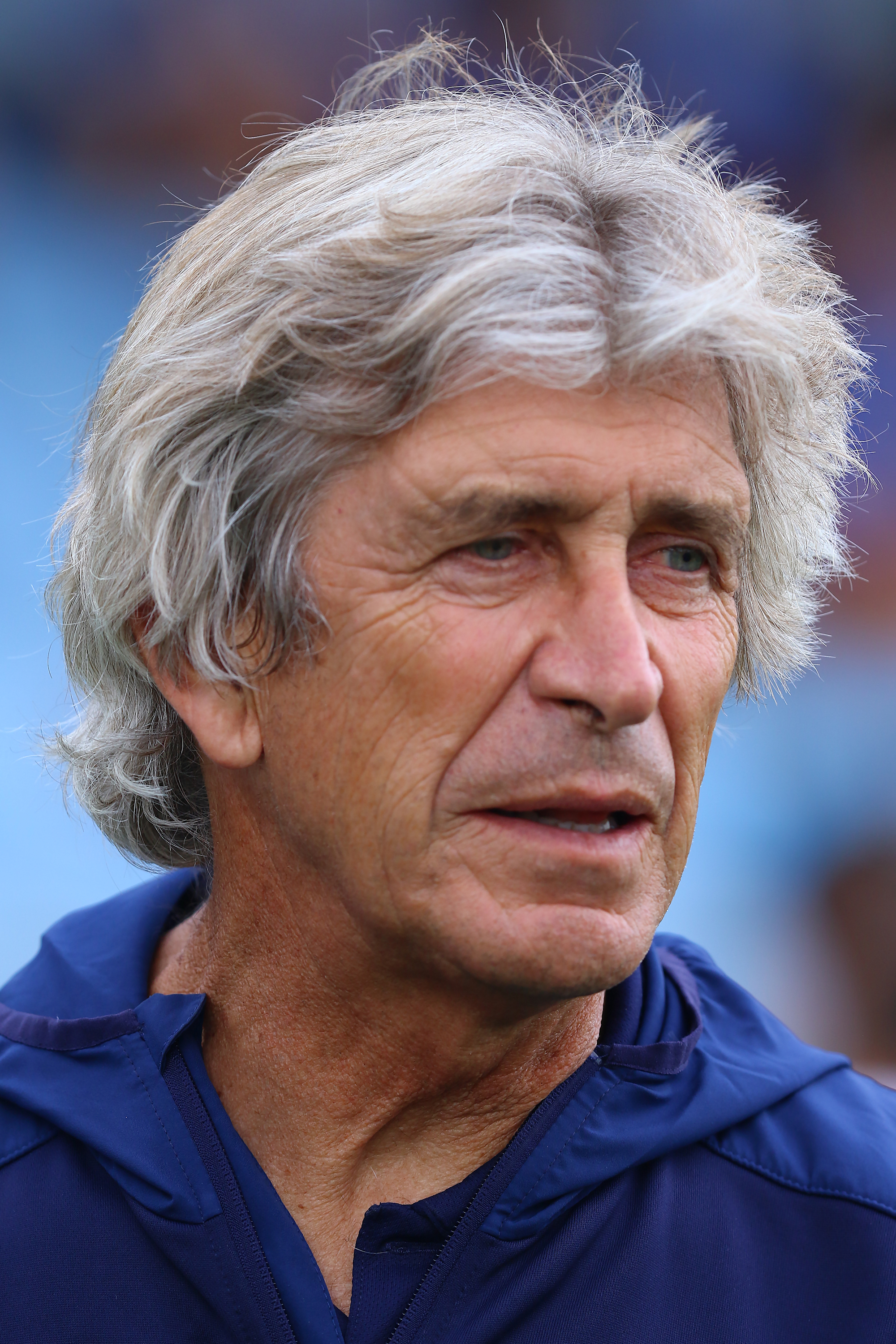
On 22 May 2018, Premier League club West Ham United announced Pellegrini as their new manager on a three-year contract. His first game in charge, on 12 August, resulted in a 4-0 away loss to Liverpool. His inaugural win for the club came in an EFL Cup match against AFC Wimbledon on 28 August. In the Premier League, after presiding over four initial defeats in the 2018-19 season, Pellegrini secured his first league victory on 16 September with a 3-1 win over Everton. In January 2019, West Ham were eliminated from the FA Cup in the fourth round by League One side Wimbledon, losing 4-2. Despite this cup exit, West Ham finished 10th in the Premier League in Pellegrini's first season, their first top-ten finish since 2016.
Under Pellegrini's leadership, West Ham twice broke their transfer record, signing Felipe Anderson for 36.00 M GBP in 2018 and striker Sébastien Haller for 45.00 M GBP in 2019. The club spent a total of 155.00 M GBP in transfer fees during his tenure, including 71.00 M GBP in the summer before the 2019-20 season. However, the 2019-20 Premier League season began with a heavy 5-0 defeat against his former club, Manchester City. In September 2019, West Ham were knocked out of the EFL Cup, losing 4-0 to League One's Oxford United. Pellegrini was sacked by the club on 28 December 2019, following a 2-1 home loss to Leicester City, which marked their fourth consecutive home defeat. At the time of his dismissal, the club was in 17th place in the league, having won only five league games all season. His win rate at West Ham across all competitions was 38.98%.
2.8. Real Betis
On 9 July 2020, it was announced that Pellegrini would become the manager of Real Betis in La Liga for the 2020-21 season, succeeding Alexis Trujillo, who had served as an interim coach. Under his leadership, Real Betis notably won the Copa del Rey in the 2021-22 season.
3. Managerial Style and Philosophy
Manuel Pellegrini is widely lauded for his distinct coaching philosophy, which emphasizes an attacking style of play, his composed demeanor, and his effective man-management skills. He advocates for a proactive, possession-based football that leverages both short and long passes, along with rapid and expansive attacks. Forwards in his system are expected to demonstrate excellent off-the-ball movement and keen awareness of space to create passing options.
His tactical approaches often involve formations such as the 4-2-3-1 and 4-4-2, which he notably employed during his time at Manchester City. The ruthlessness and variety of Manchester City's goal-scoring under his management - from intricate passing moves, crosses, and solo runs to set pieces - led The Daily Telegraph to describe City's style as "death by beautiful geometry." This phrase encapsulates his commitment to an aesthetically pleasing yet highly effective attacking brand of football.
4. Personal Life
Manuel Pellegrini's personal life includes his family and a recent public legal matter. His son, Manuel Pellegrini Pucci, is a traumatologist who joined the medical staff of Audax Italiano in 2022. As of 26 September 2022, Pellegrini himself was reported to be under investigation by HMRC for alleged tax evasion, with the claimed amount being 816.58 K GBP.
5. Honours
Manuel Pellegrini has accumulated numerous titles and individual accolades throughout his career as both a player and a manager.
5.1. As a Player
Universidad de Chile
- Copa Chile: 1979
5.2. As a Manager
Universidad Católica
- Copa Interamericana: 1993
- Copa Chile: 1995
LDU Quito
- Serie A: 1999
San Lorenzo
- Primera División: 2000-01
- Copa Mercosur: 2001
River Plate
- Primera División: 2002-03
Villarreal
- UEFA Intertoto Cup: 2004
Manchester City
- Premier League: 2013-14
- Football League Cup: 2013-14, 2015-16
Real Betis
- Copa del Rey: 2021-22
5.3. Individual
- Miguel Muñoz Trophy: 2007-08, 2021-22
- Premier League Manager of the Month: December 2013, January 2014, December 2014, August 2015
- Málaga Provincial Council: Gold Shield
6. Managerial Statistics
| Team | From | To | Record | ||||
|---|---|---|---|---|---|---|---|
| P | W | D | L | Win % | |||
| Universidad de Chile | 1 January 1988 | 31 January 1989 | 38 | 11 | 13 | 14 | 28.95% |
| Palestino | 1 January 1990 | 31 December 1991 | 90 | 31 | 31 | 28 | 34.44% |
| O'Higgins | 1 January 1992 | 31 December 1993 | 76 | 30 | 22 | 24 | 39.47% |
| Universidad Católica | 1 January 1994 | 30 June 1996 | 124 | 72 | 29 | 23 | 58.06% |
| Palestino | 1 January 1998 | 31 December 1998 | 21 | 4 | 7 | 10 | 19.05% |
| L.D.U. Quito | 1 January 1999 | 30 June 2000 | 76 | 35 | 16 | 25 | 46.05% |
| San Lorenzo | 15 February 2001 | 30 June 2002 | 78 | 38 | 20 | 20 | 48.72% |
| River Plate | 1 July 2002 | 31 December 2003 | 77 | 42 | 14 | 21 | 54.55% |
| Villarreal | 1 July 2004 | 1 June 2009 | 259 | 123 | 72 | 64 | 47.49% |
| Real Madrid | 1 June 2009 | 26 May 2010 | 48 | 36 | 5 | 7 | 75.00% |
| Málaga | 5 November 2010 | 14 June 2013 | 129 | 53 | 30 | 46 | 41.09% |
| Manchester City | 14 June 2013 | 30 June 2016 | 167 | 100 | 28 | 39 | 59.88% |
| Hebei China Fortune | 27 August 2016 | 19 May 2018 | 52 | 21 | 12 | 19 | 40.38% |
| West Ham United | 22 May 2018 | 28 December 2019 | 64 | 24 | 11 | 29 | 37.50% |
| Real Betis | 9 July 2020 | Present | 237 | 111 | 61 | 65 | 46.84% |
| Total | 1536 | 732 | 371 | 433 | 47.66% | ||
7. Legacy and Public Image
Manuel Pellegrini has left a significant mark on the clubs he managed and the broader football world, known for his commitment to attractive, attacking football and his calm, thoughtful approach. His "El Ingeniero" nickname underscores his methodical preparation and tactical acumen, distinguishing him as a manager who values structured play and careful planning.
At Villarreal, he established a foundation for sustained success, transforming a relatively smaller club into a Champions League contender. His ability to elevate teams beyond their historical standing, as seen with Málaga's deep Champions League run, cemented his reputation as a shrewd tactician capable of maximizing team potential even amidst financial constraints.
His time at Manchester City is widely regarded as a successful period, highlighted by a Premier League title and two League Cups. He fostered a free-scoring, attractive style of play, which was praised for its fluidity and effectiveness. Despite his achievements, his tenure at Real Madrid, while statistically strong, was constrained by the club's Galácticos policy, which he openly criticized for hindering his ability to build a balanced squad. This highlighted his preference for a cohesive team structure over individual star power.
Pellegrini's influence on playing styles is characterized by his insistence on possession-based, offensive football. His composed demeanor and strong man-management skills have earned him respect from players and pundits alike. While his later stints at Hebei China Fortune and West Ham United did not yield the same level of sustained success as his European peak, his overall legacy is one of a manager who consistently sought to implement an exciting and intelligent brand of football, often achieving historic results for the clubs he led.
8. See also
- List of English football championship winning managers
- List of one-club men in association football